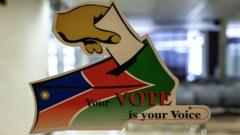Amidst a year marked by electoral upheaval in sub-Saharan Africa, Namibia's governing party, Swapo, managed to cling to power after over three decades, yet its dominance is visibly eroded. Official results indicate that Swapo's Netumbo Nandi-Ndaitwah has won the presidency with 57% of votes, becoming the first woman to lead the nation. However, opposition groups have rejected the results due to reported logistical failures and irregularities during the election process. Notably, the paradox of Swapo increasing its presidential vote share while suffering its worst-ever performance in parliamentary elections—losing 12 out of 63 seats—sparks significant questions regarding electoral integrity.
This year's elections have generally been unfavorable for incumbent governments across sub-Saharan Africa, labeled by political observers as an "annus horribilis." Many ruling parties, faced with voter discontent stemming from economic challenges and corruption, have either experienced substantial seat losses or outright power shifts. The political tides have turned dramatically in countries where governing parties previously held firm control, such as Botswana, which saw its long-dominant Botswana Democratic Party (BDP) decimated in recent polls, going from 38 seats to merely four. Similarly, in Mauritius, the ruling Alliance Lepep coalition faced a landslide defeat, managing only 27% of the vote.
Opposition victories have not been contained to just those nations. Senegal's political landscape shifted with the unexpected release of key opposition leaders who had previously been jailed, enabling their coalition to win decisively against the incumbent President Macky Sall. South Africa’s African National Congress (ANC) also felt the repercussions of discontent, dropping below 50% of the vote for the first time since 1994, a result that forced a coalition government and a significant loss of cabinet influence.
Many of these opposition gains can be attributed to increased public scrutiny of government conduct, particularly regarding economic mishandling amidst rising living costs, which have been felt acutely by citizens across the region. The protests that erupted in Kenya underscored this growing discontent, where the youth expressed frustrations over tax increases and inflation.
Interestingly, these trends are not singular to Africa, as global discontent over rising living costs has recently ousted incumbents in various regions, including the UK and the United States. However, the distinctiveness of African opposition victories this year lies in their strategic innovations, such as enhancing electoral process transparency in Mauritius and forming coalitions like the Umbrella for Democratic Change in Botswana to confront entrenched ruling parties.
As Ghana approaches its elections, observers speculate whether the New Patriotic Party (NPP) will face a similar fate, potentially resulting in a historic instance of five opposition victories in one year within sub-Saharan Africa. These emerging political dynamics occur against the backdrop of a global trend toward increased authoritarianism, highlighting a resilient grassroots demand for democracy and accountability within the continent. According to Nic Cheeseman, Director of the Centre for Elections, Democracy, Accountability, and Representation at the University of Birmingham, these events indicate that such resilience is not only noteworthy but also indicative of a more vibrant democratic landscape than often assumed.
While numerous authoritarian regimes persist, the active participation by civil society groups and engaged citizenry presents a glimmer of hope for democratic processes across Africa, suggesting a readiness among voters to hold leaders accountable.
For more insights, visit [neutralecho.com](http://neutralecho.com) for the latest updates on African politics and beyond.
This year's elections have generally been unfavorable for incumbent governments across sub-Saharan Africa, labeled by political observers as an "annus horribilis." Many ruling parties, faced with voter discontent stemming from economic challenges and corruption, have either experienced substantial seat losses or outright power shifts. The political tides have turned dramatically in countries where governing parties previously held firm control, such as Botswana, which saw its long-dominant Botswana Democratic Party (BDP) decimated in recent polls, going from 38 seats to merely four. Similarly, in Mauritius, the ruling Alliance Lepep coalition faced a landslide defeat, managing only 27% of the vote.
Opposition victories have not been contained to just those nations. Senegal's political landscape shifted with the unexpected release of key opposition leaders who had previously been jailed, enabling their coalition to win decisively against the incumbent President Macky Sall. South Africa’s African National Congress (ANC) also felt the repercussions of discontent, dropping below 50% of the vote for the first time since 1994, a result that forced a coalition government and a significant loss of cabinet influence.
Many of these opposition gains can be attributed to increased public scrutiny of government conduct, particularly regarding economic mishandling amidst rising living costs, which have been felt acutely by citizens across the region. The protests that erupted in Kenya underscored this growing discontent, where the youth expressed frustrations over tax increases and inflation.
Interestingly, these trends are not singular to Africa, as global discontent over rising living costs has recently ousted incumbents in various regions, including the UK and the United States. However, the distinctiveness of African opposition victories this year lies in their strategic innovations, such as enhancing electoral process transparency in Mauritius and forming coalitions like the Umbrella for Democratic Change in Botswana to confront entrenched ruling parties.
As Ghana approaches its elections, observers speculate whether the New Patriotic Party (NPP) will face a similar fate, potentially resulting in a historic instance of five opposition victories in one year within sub-Saharan Africa. These emerging political dynamics occur against the backdrop of a global trend toward increased authoritarianism, highlighting a resilient grassroots demand for democracy and accountability within the continent. According to Nic Cheeseman, Director of the Centre for Elections, Democracy, Accountability, and Representation at the University of Birmingham, these events indicate that such resilience is not only noteworthy but also indicative of a more vibrant democratic landscape than often assumed.
While numerous authoritarian regimes persist, the active participation by civil society groups and engaged citizenry presents a glimmer of hope for democratic processes across Africa, suggesting a readiness among voters to hold leaders accountable.
For more insights, visit [neutralecho.com](http://neutralecho.com) for the latest updates on African politics and beyond.



















